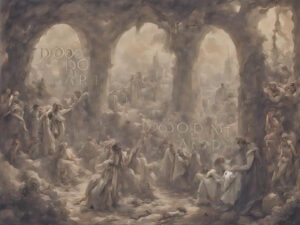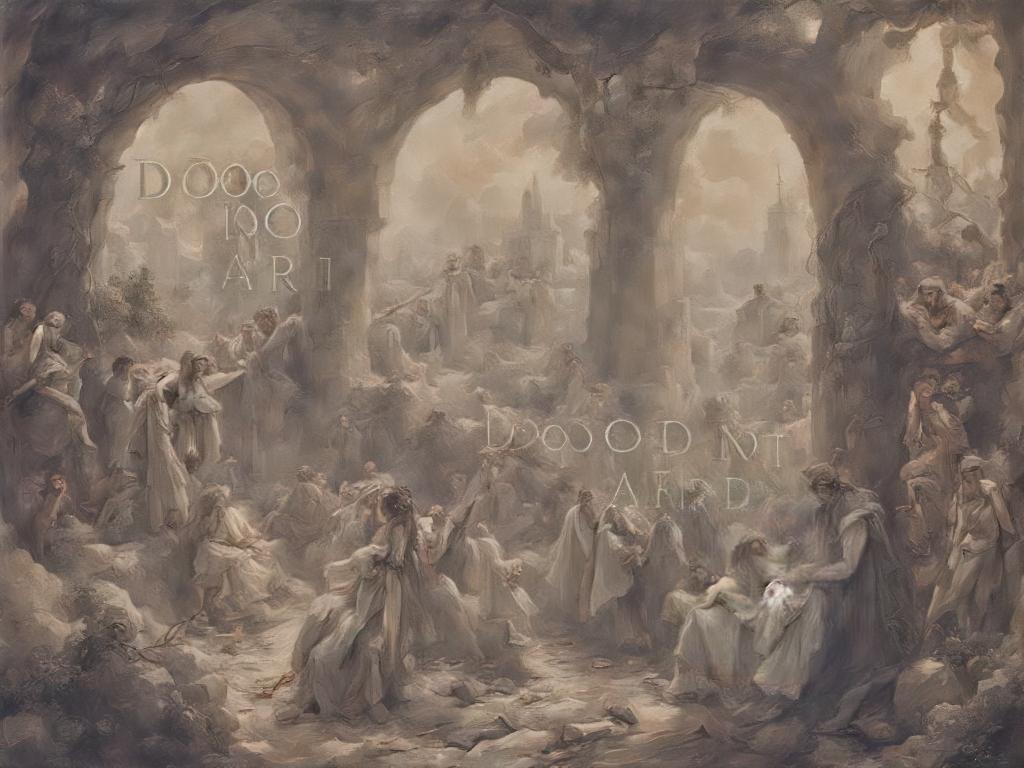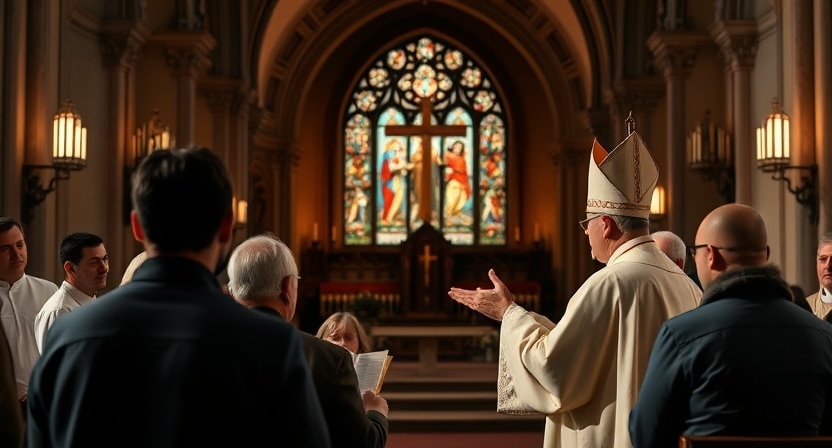TWELFTH SUNDAY OF THE YEAR
Witnesses without fear
INTRODUCTION AND CONFITEOR
Christ told his followers that they should not be afraid to declare themselves for him before other people. Are we sometimes afraid to speak and to act in a Christian way? If so, why is this? Is it because we are unwilling to suffer for Christ or is it simply that we are afraid of what others will say? Let us think about this for a moment. [Pause]
We cannot witness to Christ without his grace.
Lord, you said, ‘Do not be afraid of those who kill the body but who cannot kill the soul’. Lord, have mercy.
You said, ‘Do not be afraid, for you are worth more to God than many sparrows’. Christ, have mercy.
You said, those I will own before my Father in heaven’. Lord, have mercy.
HEADINGS FOR READING
First Reading (Jeremiah 20:10-13). The prophet is surrounded by terror, but he doesn’t lose his nerve. He remains faithful to his mission because he knows that God is with his and will uphold him.
Second Reading (Romans 5: 12-15). St Paul draws a contrast between Christ and Adam. Sin came into the world through Adam. Grace came through Christ.
Gospel (Matthew 10: 26-33). Christ exhorts his disciples to bear witness to the Gospel openly and fearlessly. If they do so he will claim them as his own at the final tribunal.
1st Reading – Jeremiah 20:10-13
10 Jeremiah said: “I heard the insults of many, and terror all around: ‘Persecute him!’ and, ‘Let us persecute him!’ from all the men who had been at peace with me and who had kept watch by my side. ‘If only there were some way that he might be deceived, and we might prevail against him and obtain vengeance from him!’

11 But the Lord is with me, like a strong warrior. For this reason, those who persecute me will fall, and they will be ineffective. They will be greatly confounded. For they have not understood the everlasting disgrace that will never be wiped away.
12 And you, O Lord of hosts, the Tester of the just, who sees the temperament and the heart: I beg you to let me see your vengeance upon them. For I have revealed my case to you.
13 Sing to the Lord! Praise the Lord! For he has freed the soul of the poor from the hand of the wicked.
Responsorial Psalm – Psalms 69:8-10, 14, 17, 33-35
R. (14c) Lord, in your great love, answer me.
8 For your sake I bear insult,
and shame covers my face.
9 I have become an outcast to my brothers,
a stranger to my children,
10 Because zeal for your house consumes me,
and the insults of those who blaspheme you fall upon me.
R. Lord, in your great love, answer me.
14 I pray to you, O LORD,
for the time of your favor, O God!
In your great kindness answer me
with your constant help.
17 Answer me, O LORD, for bounteous is your kindness;
in your great mercy turn toward me.
R. Lord, in your great love, answer me.
33 “See, you lowly ones, and be glad;
you who seek God, may your hearts revive!
34 For the LORD hears the poor,
and his own who are in bonds he spurns not.
35 Let the heavens and the earth praise him,
the seas and whatever moves in them!”
R. Lord, in your great love, answer me.
2nd Reading – Romans 5:12-15
12 Brothers and sisters: Through one man sin entered the world, and through sin, death, and thus death came to all men, inasmuch as all sinned
13 for up to the time of the law, sin was in the world, though sin is not accounted when there is no law.
14 But death reigned from Adam to Moses, even over those who did not sin after the pattern of the trespass of Adam, who is the type of the one who was to come.
15 But the gift is not like the transgression. For if by the transgression of the one the many died, how much more did the grace of God and the gracious gift of the one man Jesus Christ overflow for the many.
Alleluia – John 15:26B, 27A
R. Alleluia, alleluia.
26B The Spirit of truth will testify to me, says the Lord;
27A and you also will testify.
R. Alleluia, alleluia.
Gospel – Matthew 10:26-33
26 Jesus said to the Twelve: “Fear no one. Nothing is concealed that will not be revealed, nor secret that will not be known.
27 What I say to you in the darkness, speak in the light; what you hear whispered, proclaim on the housetops.
28 And do not be afraid of those who kill the body but cannot kill the soul; rather, be afraid of the one who can destroy both soul and body in Gehenna.
29 Are not two sparrows sold for a small coin? Yet not one of them falls to the ground without your Father’s knowledge.
30 Even all the hairs of your head are counted.
31 So do not be afraid; you are worth more than many sparrows.
32 Everyone who acknowledges me before others I will acknowledge before my heavenly Father.
33 But whoever denies me before others, I will deny before my heavenly Father.”
HOMILY
In the Gospel Christ calls for witnesses, that is, people who are not afraid to be seen to be followers of his out there in the midst of a skeptical and sometimes hostile world. Three times he tells his followers not to be afraid. I suppose it is fear that keeps most of us from a bold and generous following of Christ.
It is only a few years since the man who said, ‘My job seems to be to go around picking up insults and corpses,’ was murdered. He was Archbishop Oscar Romero of El Salvador. In the year of his death (1980) twenty thousand people were killed in the violence there.
When in 1977 he was made Archbishop of San Salvador he was, in his own words, a conservative. But he soon changed when he saw what was happening. What had a very big effect on him was the death of a friend, a leading intellectual and pastor – the Jesuit priest, Rutilio Grande. It was Grande who said, ‘in El Salvador it is practically illegal to be authentic Christian’.
Rutilio Grande was gunned to death in March of 1977 along with a seventy two year old man and a sixteen year old boy. Romero prayed for hours beside his body. Far from being deterred, he made up his mind to fight for the rights of the poor. He decided to be the voice of those who had no voice.
Every Sunday he preached at the cathedral. His homilies so electrified the country that national affairs halted when he spoke from the altar. His congregation overflowed onto the square. Loud speakers took his words to those who could not get inside. Local radio took them even further afield. He named names, dates, places where human rights had been violated during the previous week. He made public the fact of unspeakable crimes being committed, mostly by agents of the government. His crowds got larger and larger. He was creating an oasis of hope and freedom for his people.
But he soon came under constant threat of death. His best friends were murdered. And still he would not be silenced. Nor would he go into hiding or exile.
‘At the first sight of danger the shepherd cannot run and leave the sheep to fend for themselves. I will stay with my people,’ he said. He declined an armed bodyguard of friends. ‘The poor don’t have it, so why should I have it?’ through a strong faith in Christ and a deep spirit of prayer he managed to keep fear at a healthy distance.
He was shot dead in March 1980 while saying Mass – slain by a single bullet from a professional marksman. He died because he loved the poor and considered the struggle for justice an integral part of the Gospel. How well the words of Christ apply to him: ‘If anyone declares himself for me before men, I will declare myself for him before my Father in heaven’. Yet all Romero wanted was a better life and simple justice for his people. It is a strange state of affairs when such a man is considered a subversive and has to be eliminated by the powers that be.
What is the relevance of this for us who live in more peaceful places? We are not persecuted here. In fact to be a christen here (I’m thinking of Ireland and western Europe in particular) is looked upon as a sign of respectability, unlike a place such as Russia, where to be a practicing Christian is to say goodbye to changes of promotion, to the hope of ever possessing a decent flat, and so on.
But every place needs Christian witnesses. When the early Christians were no longer required to become martyrs, that is, witnesses for Christ with their blood, many became ‘confessors’, that is, witnesses through their lives of prayer and service. This opens up enormous possibilities for us all.
Christ said, ‘Witness to me before men’. Many seem to think that it’s enough to confess Christ in Church on Sunday, or to stand up in a prayer meeting where it’s safe and where we are more likely to be applauded than mocked. But Christ said it’s out there we have to witness to him. It’s in the world we have to stand up and be counted. Out there in a world that is often cruel, grasping, indifferent, skeptical, and cynical. We must witness in pubs and in the streets, on trains and buses, on shop floors and factory floors, in schools and offices, in banks and hotels, in our homes and among our neighbours. In a word, everywhere. It is not good enough to be secret disciples of Christ. We have to give public witness to Christ’s love, truth, and justice.
The Church, not just individual Christians, must bear witness before society. It must champion the cause of the poor, the marginalized, and the exploited. It must make its voice heard wherever the truth is suppressed and people are being trampled upon. At the moment the Church’s voice seems to be rather lopsided. We hear countless pronouncements about ‘the sacredness of human life’ (nine times out of ten this refers to abortion and contraception) but few about justice.
All this calls for great faith and courage. But who wants to be a member of a cowardly Church or a faithless community? We have to keep our eyes fixed on Christ who is challenging us to walk without fear along the road of faithfulness. We have to make a choice, at some stage of our lives, to lives, to live in a clear and truthful way, as though the Gospel were serious, as though we were serious about our faith and its consequences.
‘It doesn’t cost much to pay lip service’. (Dostoyevsky).
‘Good religion makes you fearless, bad religion makes you fearful.’ (Anthony de Mello).
PRAYER OF THE FAITHFUL
Let us pray that as followers of Christ we may have the courage to be his witness in the world. R. Lord, hear our prayer.
That all Christians may give witness to Christ by resisting the world’s temptations bravely and resolutely. [Pause] Let us pray to the Lord.
For all in positions of authority: that they may witness to Christ by the concern they show for others, especially the weak who cannot speak for themselves. [Pause] Let us pray to the Lord.
For all those who are suffering because of their faith or because of their stand for truth and justice. [Pause] Let us pray to the Lord.
That we may be Christ’s witnesses by making our homes places of love and understanding, and by doing our work faithfully and well. [Pause] Let us pray to the Lord.
For local needs.
Let us pray:
Heavenly Father, we know that if we live like your Son we too will have to suffer as he did. But let us take courage since he assured us of your care and protection. We make our prayer through the same Christ our Lord.
COMMUNION REFLECTION
Cardinal Newman once asked his congregation
to ponder on what Christ meant to them,
and what difference being a Christian
made in the way they lived their daily lives.
He asked:
‘Is it the case that there is nothing we resolve,
nothing we do or do not do,
nothing we avoid or choose,
nothing we give up or take up
which we would not resolve,
or do, or omit,
or avoid, or choose, or give up
if Christ had not died
and if heaven were not promised us?’
‘I really fear,’ he went on,
‘that most of those who call themselves Christians,
would go on almost as they do,
if they believed Christianity
to be nothing more than a fable’.


